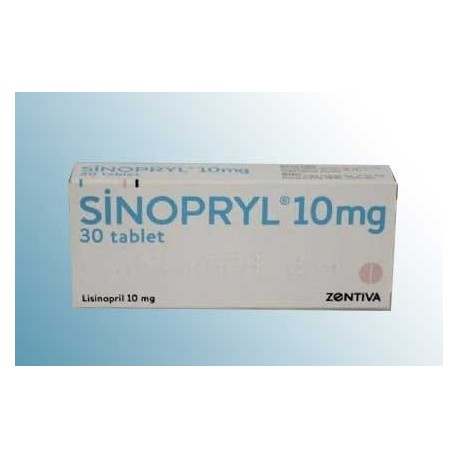 View larger
View larger Volume discounts
| Quantity | Discount | You Save |
|---|---|---|
| 2 | 5% | Up to $3.20 |
| 3 | 10% | Up to $9.60 |
| 4 | 15% | Up to $19.20 |
| 5 | 20% | Up to $32.00 |
More info
SINOPRYL (Lisinopril) 20 mg tablet To be taken orally.
Active ingredient
Lisinopril
Excipients
Mannitol, lactose hydrus, corn starch, pregelatinized starch, magnesium stearate, red iron oxide (E172), yellow iron oxide (E172)
1. What is SINOPRYL (Lisinopril) and what is it used for?
SINOPRYL (Lisinopril) belongs to the angiotensin converting enzyme inhibitor (ACE) drug group and contains 20 mg of lisinopril.
• Lisinopril dilates your blood vessels. This helps lower blood pressure. This also makes it easier for the heart to pump blood around the body.
SINOPRYL (Lisinopril) is a white, round, scored tablet. Available in blisters containing 30 tablets.
SINOPRYL (Lisinopril) is used in the following conditions:
In the treatment of high blood pressure (hypertension),
- In the treatment of heart failure (shortness of breath, swelling in the legs and fatigue after light exercise) caused by the heart's difficulty in pumping blood to your body,
If you have recently had a heart attack (myocardial infarction) that can weaken your heart, lisinopril will slow this weakening.
If you have high blood pressure with kidney problems due to diabetes (diabetes). SINOPRYL (Lisinopril) is used to treat high blood pressure (hypertension) in children older than 6 years.
2.How to use SINOPRYL (Lisinopril)?
Instructions for proper use and dose/frequency of administration
Adults with high blood pressure (hypertension)
The starting dose is usually 10 mg per day. It can be gradually increased to 20 mg per day, which is the maintenance dose (the dose you will use continuously). The highest dose that can be used daily is 80 mg.
Your doctor will decide the dose to use based on your blood pressure and other medical conditions.
If you are using high doses of diuretic drugs (diuretics), your doctor may ask you to stop these drugs 2-3 days before using SINOPRYL (Lisinopril).
Adults with heart failure
The starting dose is usually 2.5 mg per day. Your doctor may increase the dose, up to 35 mg per day, depending on your response to the drug. The dose will be gradually increased over several weeks.
Heart attack
Treatment can be started within 24 hours of a heart attack.
The starting dose is usually 5 mg per day for the first 2 days. On the third day, the dose can be increased to 10 mg. Treatment can continue for about 6 weeks after the heart attack.
Kidney problems due to diabetes (diabetes)
The starting dose is usually 10 mg per day, which may be increased to 20 mg once daily to reduce diastolic blood pressure (diastolic blood pressure) below 90 mmHg.
If you have the impression that the effect of SINOPRYL (Lisinopril) is too strong or too weak, talk to your doctor or pharmacist.
3. What are the possible side effects?
Like all medicines, there may be side effects in people who are sensitive to the substances contained in SINOPRYL (Lisinopril).
If any of the following occur, stop using SINOPRYL (Lisinopril) and IMMEDIATELY inform your doctor or contact your nearest hospital emergency department
• If swelling, skin itching and rash develop on the hands, feet, face, lips or throat causing difficulty in swallowing/breathing,
• If redness, swelling or peeling develops on your lips, eyes, mouth, nose and/or genitals, accompanied by blistering of the skin. You may also have a fever, swollen lymph nodes or joint pain.
These indicate that you are allergic to SINOPRYL (Lisinopril). Allergic reactions are more common in black people.
Other side effects
Very common: may occur in at least 1 in 10 patients.
Common: less than 1 in 10 patients, but more than 1 in 100 patients.
Uncommon: less than 1 in 100 patients, but more than 1 in 1,000 patients. Rare: less than 1 in 1,000 patients.
Very rare: less than 1 in 10,000 patients.
Not known: Cannot be estimated from the available data.
Widespread
Dizziness, headache, cough
Feeling faint when standing up quickly, dizziness (orthostatic hypotension)
diarrhea, vomiting
kidney problems, including kidney failure
Unusual
• Temperament changes, balance problems and dizziness (vertigo), changes in the sense of taste, sleep problems, numbness, tingling, burning sensations in the skin (paresthesia)
Increased heart rate, irregular heartbeat, chest pain, and more serious conditions including heart attack and stroke
• Raynaud's phenomenon: discoloration, pain, tingling or warming of the big toe and fingers when faced with cold or pressure
Runny nose, itching, sneezing and stuffy nose (rhinitis)
Difficulty in penile erection or ejaculation (impotence)
fatigue, weakness
Nausea, abdominal pain, indigestion
rash, itching
Increase in blood urea, increase in serum creatinine, increase in liver enzymes, increase in blood potassium
Rare
confusion
dry mouth
hair loss, baldness
enlargement of breasts in men
Itchy, raised rash

